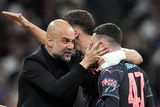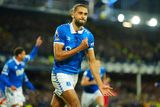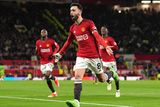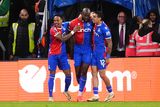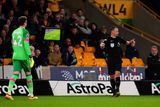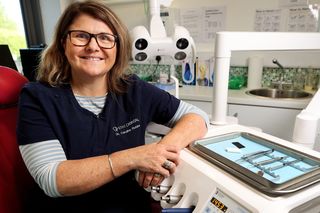It's never good when your keeper is your best player
De Gea may not have it easy if he leaves Old Trafford
Madrid is still the place in football where most of the sport’s dreamers believe they can turn into dream-makers
If Louis van Gaal turns out to be mistaken and David de Gea does accept Real Madrid's invitation to ease out Iker Casillas, the goalkeeper they called San Iker in happier times at the Bernabeu, presumably the outstanding performer of Manchester United's season will know in advance it might be a more complicated business than many people realise.
It isn't easy anywhere, let alone somewhere with Madrid's record of politics and infighting, when a new kid on the block is ushered in to replace someone who has become an institution in the way Casillas has.
When Larry Lloyd joined Liverpool from Bristol Rovers in 1969, it was because Bill Shankly wanted someone who could eventually take over from Ron Yeats, the club's distinguished centre-half and captain. The new signing arrived at Anfield to find Yeats's wife waiting for him. "Let me tell you something, young man," she told Lloyd. "You have no chance, you are simply not in his class."
As for the goalkeepers' union, that tight little community who apparently always look after their own, David James could barely look at Brad Friedel when the American was recruited by Liverpool in 1997 to challenge for his place. "All I could think was: 'Who the effing hell are you?' and: 'Where's your work permit?' I was asking all these questions about whether he'd played enough games for America because I wanted them to send him home."
When Friedel made his debut, James was desperate for it to go horribly wrong - "every time the ball went near him I was thinking: 'Go on, drop it.'" - and if that sounds remarkably self-centred, it is far from the only story of this kind in the goalkeeping fraternity. At PSV Eindhoven, Ronald Waterreus used to switch on the television at all sorts of unspeakable hours to make sure his room-mate and fellow shot-stopper Georg Koch did not get a decent night's sleep before matches.
Casillas might be a lot more welcoming to a fellow Madridista. Then again, he might not. He took it as a personal affront the last time he was removed from the team and, whether it is true or not that he was the instigator of all those corrosive dressing-room leaks, the memory still lingers of Jose Mourinho's first day back at Chelsea and his change in body language when I asked him about the consequences and rancour of favouring Diego Lopez.
It certainly wouldn't be straightforward for De Gea, who should also be aware that he could wear Madrid's colours with distinction over the next decade and still find himself jeered if he dares to misjudge a cross later in his career. Casillas can tell him all about that after some of the treatment he has encountered over the past few months, whereas Cristiano Ronaldo and Gareth Bale might also testify about the way the Bernabeu crowd can be high on disdain and low on gratitude. "It is not a sane mentality," Rinus Michels once said of Barcelona. Yet no club is more impulsive, more impatient and more prone to the panolada, the mutinous waving of white hankies, than their great rivals.
That's the downside. The alternative argument is that Madrid is still the place in football where most of the sport's dreamers believe they can turn into dream-makers. It is obvious why the club's president, Florentino Perez, is attracted to De Gea (nothing will convince me De Gea wouldn't have saved the shot from Alvaro Morata that got the hankies fluttering again and eliminated Madrid from the Champions League) and the unfortunate truth for United is that it would still be a shock if Van Gaal is correct and De Gea chooses to bat away Madrid's advances.
Plainly, the alternative would be a considerable setback for Van Gaal given the consistently upward trajectory of De Gea's career since those early days in Manchester when he could be a danger to his own team and Eric Steele, then United's goalkeeping coach, talked of him being a poor trainer, "lazy" when it came to learning English, and eating "too many tacos". De Gea's raw potential was always obvious but there is no point trying to airbrush out of history how vulnerable he was back then.
His improvement since then has been phenomenal and the question for United now has to be whether there are contingency plans to make sure the process of replacing him would be as seamless as possible.
Petr Cech has been mentioned as a possible replacement and it was intriguing to discover United's chief executive, Ed Woodward, met Mourinho at a hotel in London on Friday (though the relevant people assure me it was purely a case of bumping into one another). Tottenham have a long history of taking United's money that means their supporters should feel slightly uneasy about the potential availability of Hugo Lloris. Yet, equally, let's not disregard that there is also Victor Valdes, one of the mainstays of Pep Guardiola's great Barcelona sides, in reserve at Old Trafford. Valdes might not be a long-term solution at the age of 33 but he has won the Ricardo Zamora trophy as the best goalkeeper in La Liga more than anyone else and the answer might be staring United in the face if his year recovering from a knee injury has not dulled his reflexes.
There are certainly enough options to make a reasonable argument that United's more glaring issue this summer will not theoretically be replacing De Gea but planning for the other end of the pitch and how to compensate for the fact that all three of their main strikers are, to varying degrees, on the wane.
Those of us who imagined Van Gaal's appointment might re-invigorate Robin van Persie now have to accept he will probably never be the player who bewitched Old Trafford in his first season at the club.
Radamel Falcao ought to be grateful he has been spared the league's wooden-spoon awards because of Mario Balotelli's risible efforts at Liverpool and Wayne Rooney is approaching the point of his professional life when age slowly becomes the footballer's hardest opponent. He is 30 in October and his body shape has always made United suspect he might have to re-invent himself as a midfielder once he is on the way down.
It was David Moyes who identified the lack of dynamism in United's attack and set about exploring whether Edinson Cavani might be the answer. Falcao was supposed to bring his own stardust but United have not scored any more freely this season than under Moyes, currently two short of last year's total of 64, and the presence of so many high-reputation strikers seems to have disguised a revealing truth since Alex Ferguson ushered himself into retirement. Manchester City have amassed 183 league goals since then. Liverpool have 152, Arsenal 135 and Chelsea, the boring so-and-sos, 141. United have managed 126.
Memphis Depay might help to make up the shortfall but there is still some way to go bearing in mind that in Ferguson's last eight years the team averaged 80 league goals per season. It is now around the low-60s and, unfortunately for Falcao, the chances of United completing the £43.2m deal to sign him from Monaco beyond the current loan arrangement are somewhere between non-existent and miniscule.
Falcao's decline has been so difficult on the eye that he is now attracting the one thing no footballer ever wants, pity, and there are people at Old Trafford who have started talking about his inadequacies in a way that reminds me of how Alvy Singer, Woody Allen's character, used to excuse Annie Hall's erratic parking. "That's OK," Alvy said. "We can walk to the kerb from here."
De Gea is a different matter entirely and it would be intriguing to know exactly why Van Gaal believes the Spaniard will opt to remain in Manchester when the lesson of history is that Madrid generally get what they want. He is not, however, as irreplaceable as some people appear to believe. For United, the greater issue might actually be returning to the days when it would have felt implausible that their best player was their goalkeeper.
Observer
